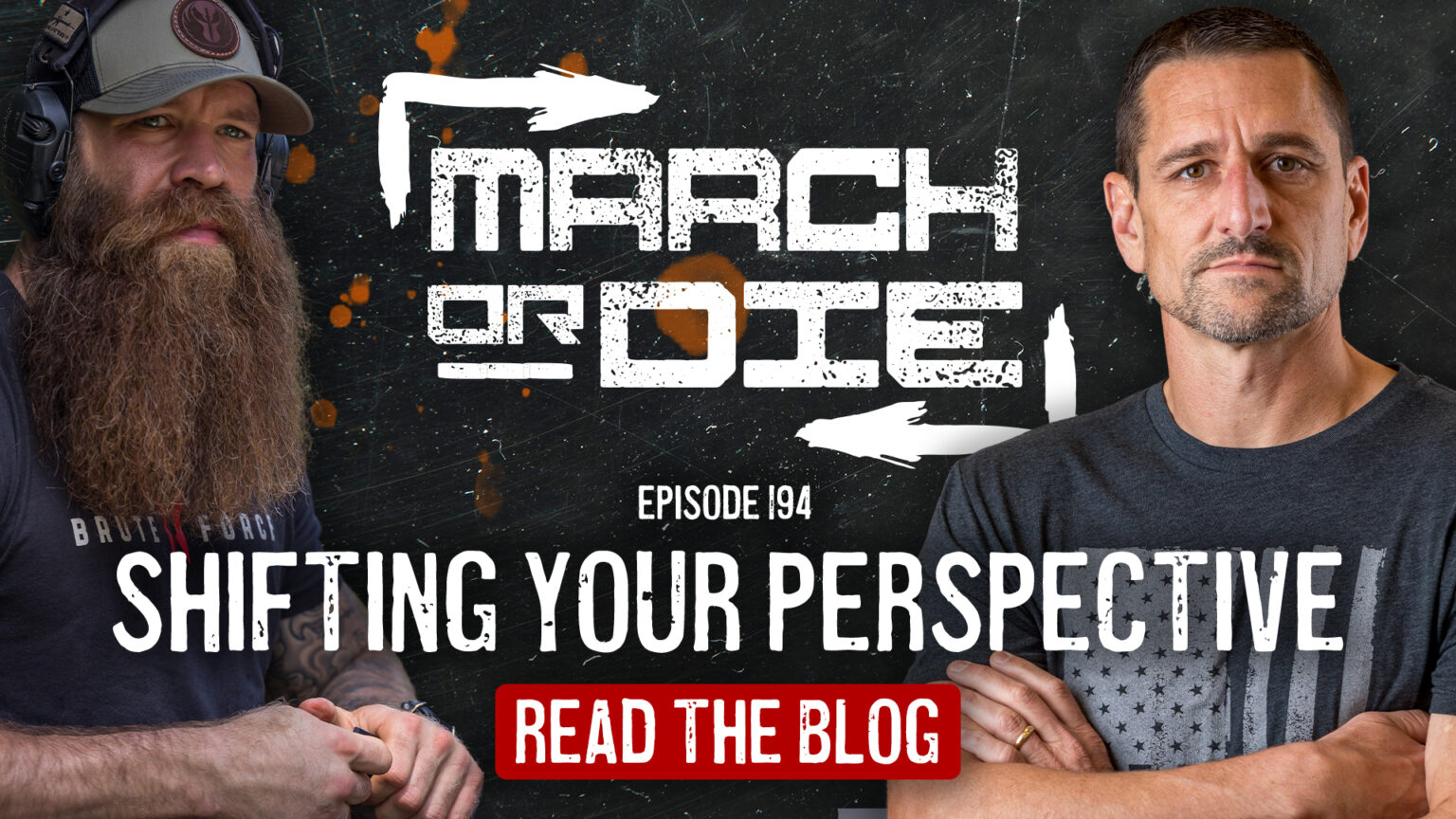In this week’s episode of March or Die, host Jeremy Stalnecker is joined by co-host Sean Kennard for a powerful discussion on one of life’s most important yet often overlooked principles: perspective. The way we view the world around us, especially in moments of trial or hardship, can determine whether we march forward with resilience or stay stuck, letting life pass us by.
What Is Perspective and Why Does It Matter?
Jeremy and Sean kick off the conversation by defining perspective as the lens through which we view life, based on our experiences, emotions, and belief systems. Simply put, how we perceive our circumstances can either limit or empower us. Two people can experience the same situation but have completely different takeaways due to their unique perspectives. One person may feel defeated, while the other sees an opportunity for growth.
Jeremy explains how this show is all about marching forward, even when it feels easier to give up and die—emotionally, relationally, or spiritually. In this episode, the duo reminds us that perspective plays a critical role in whether we stay where we are or push ahead.
The Biblical Perspective Shift
Jeremy references several biblical passages that highlight the importance of shifting perspective, such as James 1:2-3 and Romans 12:2. Both passages encourage believers to see trials and temptations not as setbacks but as opportunities for growth and transformation.
James urges us to count it joy when we face trials because these moments refine our patience and character. Similarly, Paul in Romans reminds us to transform our minds, urging us not to conform to the world’s perspective but to adopt God’s perspective. This requires a deliberate shift in how we view our circumstances—choosing to see God’s purpose behind every challenge.
Real-Life Example: Paradigm Shifts in Action
One of the most relatable moments in the episode is when Sean shares a story from Stephen Covey’s 7 Habits of Highly Effective People. Covey tells of a moment when he was irritated by a father whose kids were acting out on a subway. When Covey asked the father to control his children, the father revealed that they had just come from the hospital where their mother had died. In an instant, Covey’s perspective shifted—from frustration to compassion.
This story underscores how powerful a shift in perspective can be. The circumstances hadn’t changed, but Covey’s view of them had, opening the door for empathy and understanding. Jeremy and Sean highlight that this ability to shift perspective is crucial, especially when dealing with personal relationships, marriage, or even broader societal issues.
Choosing Joy and Gratitude
One of the most profound takeaways from the episode is the idea that perspective is a choice. Sean admits that, as a former police officer, he sometimes finds himself viewing situations from a more negative lens due to his past experiences. However, he shares how he’s been working on choosing joy and gratitude, especially when life feels hard.
The hosts emphasize that while it’s easy to get caught up in negative experiences or emotions, we have the power to shift our focus to the good. Choosing to believe in the good, especially in people, can drastically change how we interact with the world and handle difficult situations.
Perspective in Relationships: Believing the Good
Sean delves into how perspective is especially important in relationships, particularly in marriage. He explains that believing your spouse is inherently good—even when you’re upset—can prevent unnecessary conflict. For example, if his wife says something in frustration, instead of assuming she’s trying to be hurtful, he chooses to believe that she means well, which de-escalates the situation.
This principle applies broadly to all relationships. If we shift our perspective to assume the best in others, we can avoid misunderstandings and deepen our connections.
Embracing Reality: Taking Responsibility for Where You Are
Another critical element discussed in the episode is the importance of embracing your reality, even when it’s broken or difficult. Jeremy explains that instead of playing the victim and waiting for someone to rescue you, it’s vital to take responsibility for your situation. Even if you didn’t create the problem, it’s now your reality, and you must find a way forward.
This approach shifts the mindset from helplessness to empowerment, forcing us to look for resources and strategies to move beyond our circumstances.
Learning from Failure: A Growth Mindset
A key point made during the conversation is that failure isn’t the opposite of success—it’s a part of it. Jeremy and Sean encourage listeners to develop a growth mindset, seeing every failure as an opportunity to learn and grow. This shift in perspective not only helps us move through difficult times but also equips us for future challenges.
By asking, “What can I learn from this?” instead of focusing on the negative, we can take actionable steps forward, turning setbacks into stepping stones.
Surrounding Yourself with Positive Influences
As the episode draws to a close, the hosts emphasize the importance of community and surrounding yourself with people who can offer a fresh perspective. Whether it’s mentors, friends, or family, having people in your life who challenge you to grow and shift your focus is essential.
Moreover, Sean stresses that we are not only influenced by the people around us but also by the content we consume. He reminds us to be mindful of what we allow into our minds—whether through media, social media, or entertainment—as it will inevitably shape our perspective.
Process, Persistence, and Consistency
Finally, Jeremy shares one of the episode’s most practical takeaways: commit to the process, persist, and be consistent. If we are truly committed to growth and forward movement, we must be willing to shift our perspective when necessary. This commitment to the long-term process is what ultimately leads to success, even when we hit walls or face setbacks.
By maintaining a growth mindset and sticking to the path, we can learn to see obstacles not as roadblocks but as opportunities for growth.
Conclusion: Perspective Changes Everything
At the heart of this episode is a powerful truth: your perspective shapes your reality. But the good news is that you have the power to shift that perspective. Whether through biblical principles, personal relationships, or life’s biggest challenges, learning to view things differently can make all the difference between staying stuck and marching forward.
What perspective shift do you need to make today? Share your thoughts in the comments, and don’t forget to subscribe to the March or Die podcast for more episodes on resilience, faith, and leadership.






